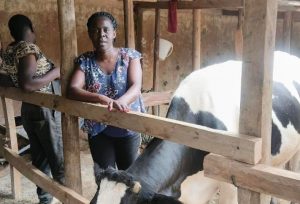Youth unemployment remains a pressing issue in Kenya, and the traditional job market often fails to provide adequate opportunities; therefore, many young people are turning to farming as a means of creating employment for themselves and generating income.

In the rural landscapes of Vihiga, Kenya, resides a 32-year-old Merryline Awuor Keya, who has embraced farming.
From an exercise that has for ages been perceived as unprofitable, she has discovered the lucrative nature of the agricultural sector.
Merryline has been a fashion designer since 2015, when she decided to concentrate more on farming.
She opted to venture into farming after realising she had a lot of water that flooded her compound. She first put up two fish ponds, each containing more than 1500 pieces of fish.
She has embraced fishing as well as crop and livestock farming. She has chickens, cows and rabbits.
In the process, she has embraced organic farming. She uses rabbit urine as manure for her farm, cow waste and plant waste to produce biogas that generates heat that she uses for cooking. She has taken every opportunity that she sees on her farm to make life easy for her family.
She says the farm has kept her busy. When she is not designing bags and clothes, she is managing her farm. She wakes up early in the morning to milk her two cows that provide seven litres of milk each before she engages in other farm duties.
Recognising the absence of a market, Merryline emerged as an innovator and decided to open a fish hotel named Nadanya Green Ltd. This bold move not only addressed the market gap but also provided employment for the community.
She sourced everything from her premise. This includes the vegetables, onions, tomatoes and kale that she grows on her farm, as well as the fish (tilapia and catfish) that she breeds in her ponds.
By sourcing ingredients from her premises, Merryline fosters a sense of self-sufficiency and control over her entire supply chain for her fish point hotel.
With a growing population and increased demand for food, there are ample market opportunities for farmers like Merryline. She has taken the opportunity to meet this need and now sells rabbits at Sh1000, Kienyeji chicken for Sh800 depending on the size and a tray of eggs at Sh750 each.

This approach not only allows her to deliver a truly farm-to-table experience but also supports local agriculture.
She notes that the agricultural sector is highly competitive, but there are opportunities for young farmers who are willing to innovate and take risks. She urges the youth to embrace self-employment and be patient with growth that comes gradually.
To her, it has not all been rosy, as she has faced a number of challenges, including expensive fish feeds and equally expensive vaccines for livestock.
The desire for young people to enter farming signifies a transformative shift in the country’s agricultural landscape. Youth farmers are reshaping the perception of farming as a viable and rewarding career choice.
With continued support from the government, young Kenyans have the potential to drive sustainable agricultural development, contribute to food security and create a prosperous future for themselves.
By Rose Wasike


